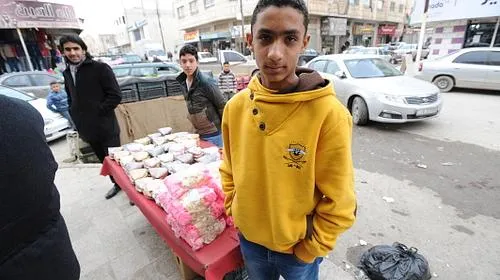AMMAN (June 10, 2016)– As World Day Against Child Labor falls on June 12, humanitarian organization CARE warns of the direct impact of the protracted conflict in Syria in its sixth year, particularly on the future of Syrian children, as many of them are forced into child labor, facing exploitation and staggering living conditions. According to International Labor Organization, the number of working children in Jordan is estimated to be more than 100,000, rising from 33,000 before the beginning of the conflict, 40 percent of whom work in particularly labor intensive, often dangerous jobs such as mechanic shops and garages.
“Many Syrian refugee children, in Jordan and in the region, are missing their education as they are forced to be the sole breadwinners for their families,” says Salam Kanaan, Country Director of CARE in Jordan. “About one third of Syrian refugee families in Jordan are female-headed. Refugee women often feel vulnerable and struggle to find safe income resources, which forces them to send their children to work instead of school.” Around 90,000 Syrian refugee children in Jordan are not going to school, according to the International Labor Organization.
For every ten people in Jordan at least one is a registered Syrian refugee, whereas in Lebanon one of every four people is a registered Syrian refugee, the highest number of refugees per capita in the world. More than 50 percent of Syrian refugees in the region are children under the age of 18. According to UNHCR, 35 percent of Syrian school-aged children are out of school in Jordan, with many forced into child labor. Additionally, it is estimated that 90 percent of Syrian refugees outside of camps are living below the poverty line.
Since September 2014, CARE in Jordan has been implementing a cash-for-education program; a protection‐oriented process that seeks to ensure Syrian refugee children’s right to education, by removing them from the labor market, and sending them back to schools. The cash-for-education program helps to support identified “at‐risk” Syrian refugee households, and encourage them to keep their children in school and avoid engaging them in forced child labor, early and forced child marriage, and any other anticipated negative coping mechanisms. The program started with 100 children in its first year and has expanded to include about 500 children in its second year. Including all children from the first year; it is about to start its third year with a larger number of children.
“The average income per Syrian refugee child from work is as low as $40 per month, which is shockingly low,” explains Kanaan. “We started the conditional cash program providing each beneficiary family with $100 per month over the scholastic year under the condition of sending their child to school and refraining from sending him, or her, to work. CARE also monitors the child’s attendance and academic performance throughout the year. So far we have had a 100 percent success rate in this program as none of the children have dropped out. This year we have expanded the program to include more children, and we have increased the amount from $100 to $140, so that families feel that their needs are being met more adequately.”
As of April, the Jordanian government has introduced measures that help more Syrian refugees obtain a work permit, giving them access to the labor market without the jeopardy of working illegally and, therefore, being subject to exploitation and deprivation from their entitlements. According to UNHCR these new regulations are enabling an average of 200 Syrians each day to regularize their employment status. CARE welcomes the decision of the Jordanian government which will hopefully help reduce the number of working children, who in many cases are forced to work as they were reportedly less likely to be detained or deported in the event of being caught working illegally. Nevertheless, CARE urges the international community to provide more highly-needed financial support to help countries like Jordan, Lebanon, and Turkey address the burden of the Syria crisis. So far only a quarter of the UN funding appeal for the Syria crisis in the region has been met.
“Without further support being provided for Syrian refugee families and host countries, and without stable income resources and livelihood opportunities, the number of Syrian children forced into child labor will worsen, and more will continue to be deprived from education,” adds Kanaan.
About CARE: Founded in 1945, CARE is a leading humanitarian organization fighting global poverty. CARE has more than six decades of experience helping people prepare for disasters, providing lifesaving assistance when a crisis hits, and helping communities recover after the emergency has passed. CARE places special focus on women and children, who are often disproportionately affected by disasters. To learn more, visit www.care.org.

